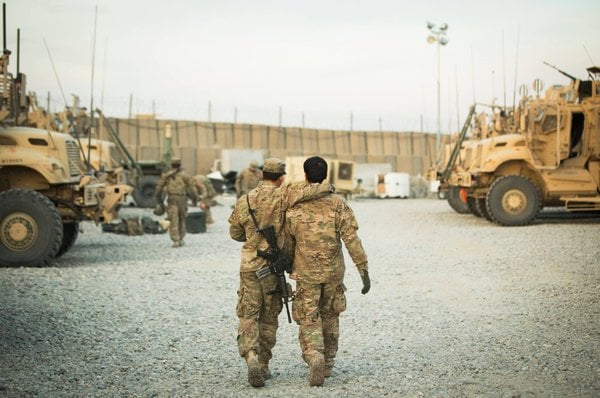Keeping a Promise to Afghans
New York Times
13 يناير 2015

The legacy of America’s war in Afghanistan, which nominally ended on New Year’s Eve, will come into sharper focus in the coming decade. Historians will spend years figuring out what went right or wrong and which of Washington’s programs will prove to be of lasting value.
There is one crucial piece of unfinished business that will speak volumes at the end of the day: whether the United States kept its promise to Afghan military interpreters who were offered the opportunity to resettle in America in recognition of the monumental risks they took.
Congress created special visa programs for Afghan and Iraqi military linguists starting in 2006. Early on, it was managed with callous disregard for its intended Afghan beneficiaries; only a fraction of the petitions submitted were approved. Secretary of State John Kerry has taken commendable steps over the past two years to streamline the review process and approve a higher percentage of cases. But the State Department remains hamstrung by a problem of its own making that only Congress can fix.
About 12,000 Afghan linguists have pending applications for the special visa. Under current law, however, the State Department has the authority to issue only 4,000 visas over the next two years. This logjam was entirely avoidable if only Washington bureaucrats had operated with greater dispatch. During some of the toughest years of the war, American officials in Kabul and Washington sat on, or rejected, the bulk of applications in the pipeline. In 2010 and 2011, for instance, only a few dozen Afghan linguists — an astonishingly small number — were allowed to immigrate.
At the time, some American officials in Kabul took the view that the program would worsen the country’s brain drain and that enabling young, bilingual, educated Afghans to leave their homeland would send the wrong message about the state of a war that Washington portrayed with disingenuous optimism over the years. Many Afghan linguists actually received rejection letters that described them, indefensibly and without evidence, as suspected threats.
The sad result was more than 6,500 visa slots that Congress set aside for the early years of the program expired, leaving brave Afghans and their families in limbo. Many are living in hiding today, unable to return to their native provinces where the Taliban hold sway.
Fortunately, their plight came to the attention of American servicemen and servicewomen, who have lobbied their representatives in Congress seeking help. As the scope of the problem became clear to lawmakers, a remarkable if unlikely coalition from opposite ends of the political spectrum came together in an effort to undo a monumental wrong.
In the House, Representative Earl Blumenauer, an Oregon Democrat, and Representative Adam Kinzinger, a Republican from Illinois who is a former Air Force pilot, led the effort last year to extend the program and authorize the 4,000 visa slots currently available. In the Senate, John McCain, a Republican from Arizona, and Jeanne Shaheen, a Democrat from New Hampshire, championed the cause.
In an era of partisan acrimony and gridlock on Capitol Hill, their leadership on this issue has been inspirational. But much remains to be done. The White House will soon present to Congress a budget request that will almost certainly include provisions to create new visa slots for Afghan linguists. Lawmakers should ensure those are financed and approved either as part of the defense bill, if they actually manage to pass one this year, or through stand-alone legislation.
Failing to give all eligible and deserving applicants a fair shot at a new start in the United States would represent an abdication of a promise that helped persuade linguists to put their lives on the line. That would add a shameful chapter to the legacy of a war that has been grim enough for Afghans.
 عن أمل جنبلاط المتجدد: لبنان يستحق النضال
عن أمل جنبلاط المتجدد: لبنان يستحق النضال
 صحافيون أم عرّافون!
صحافيون أم عرّافون!
 ماذا يجري داخل أروقة بيت الكتائب المركزي؟
ماذا يجري داخل أروقة بيت الكتائب المركزي؟


 عن الخرائط التي تُرسم والإتفاقات التي تتساقط!
عن الخرائط التي تُرسم والإتفاقات التي تتساقط!
 “الإنحراف في الحياة”/ بقلم كمال جنبلاط
“الإنحراف في الحياة”/ بقلم كمال جنبلاط
 هاشتاغ #صار_الوقت يحل أولاً في حلقة جنبلاط
هاشتاغ #صار_الوقت يحل أولاً في حلقة جنبلاط
 طاولة نقاش عن أزمة الصحافة في جامعة AUST
طاولة نقاش عن أزمة الصحافة في جامعة AUST
 عبدالله: ليظهر لنا وزير مكافحة الفساد حرصه في صفقات البواخر والفيول
عبدالله: ليظهر لنا وزير مكافحة الفساد حرصه في صفقات البواخر والفيول
 عبدالله: غريب أمر وزارة مكافحة الفساد!
عبدالله: غريب أمر وزارة مكافحة الفساد!

 Comment to Uri Avnery: How Sad What Is Looming Ahead
Comment to Uri Avnery: How Sad What Is Looming Ahead
 “Not Enough!”
“Not Enough!”
 … لمن لم يقرأ يوسف البعيني/ بقلم وسام شيّا
… لمن لم يقرأ يوسف البعيني/ بقلم وسام شيّا
 كمال جنبلاط في مولده الأول بعد المائة: تعاليمه وأفكاره ما زالت الحلّ/بقلم عزيز المتني
كمال جنبلاط في مولده الأول بعد المائة: تعاليمه وأفكاره ما زالت الحلّ/بقلم عزيز المتني
 رئيس حزب/ وليس (… سابقاً)/ بقلم د. خليل احمد خليل
رئيس حزب/ وليس (… سابقاً)/ بقلم د. خليل احمد خليل
 التوازن السياسي في لبنان
التوازن السياسي في لبنان
 لبنان… مشاريع انقلابية مؤجلة
لبنان… مشاريع انقلابية مؤجلة
 جنبلاط وحَمَلة أختام الكاوتشوك
جنبلاط وحَمَلة أختام الكاوتشوك
 Le Liban est un symbole de tolérance
Le Liban est un symbole de tolérance
 Our Automated Future
Our Automated Future
 The True Origins of ISIS
The True Origins of ISIS
 Les Misérables vs. Macron
Les Misérables vs. Macron
 عذراً أيها المعلم/ بقلم مهج شعبان
عذراً أيها المعلم/ بقلم مهج شعبان
 رساله الى المعلم / بقلم ابو عاصم
رساله الى المعلم / بقلم ابو عاصم
 إلى روح القائد والمعلم كمال جنبلاط/ بقلم أنور الدبيسي
إلى روح القائد والمعلم كمال جنبلاط/ بقلم أنور الدبيسي
 أسرار وعناوين الصحف ليوم الجمعة 14 كانون الاول 2018
أسرار وعناوين الصحف ليوم الجمعة 14 كانون الاول 2018














